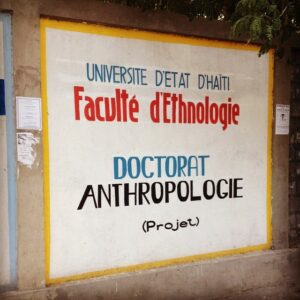A Case Study of Dissertation Research Collaboration in Rural Haiti – Part 4 of 4
 In the previous posts of this four-Part series on research collaboration in rural Haiti, Florida doctoral student and WGF grantee Andrew Tarter discussed the benefits to social scientists of collaborating with research counterparts at Faculté d’Ethnologie (Department of Ethnology) at L’Université d’État d’Haïti (State University of Haiti). He provided a list of steps that constitute a blueprint toward successful collaboration. Here Tarter concludes by addressing some challenges faced, and suggesting additional routes to collaboration.
In the previous posts of this four-Part series on research collaboration in rural Haiti, Florida doctoral student and WGF grantee Andrew Tarter discussed the benefits to social scientists of collaborating with research counterparts at Faculté d’Ethnologie (Department of Ethnology) at L’Université d’État d’Haïti (State University of Haiti). He provided a list of steps that constitute a blueprint toward successful collaboration. Here Tarter concludes by addressing some challenges faced, and suggesting additional routes to collaboration.
Challenges to collaboration
The process of research collaboration I have discussed in previous posts of this 4-part series sounds rosy. Make no mistake about it; there were real challenges as well. Being responsible for many aspects of the physical well-being of three individuals is a task that was new to me, and one that consumed a great deal of my time. There were daily tasks, weekly tasks, and monthly tasks. Daily, I had to offload data (audio interviews, GPS paths and points, photos and surveys) when our research team was done for the day, and reverse the process (program GPS paths and points, clear audio interviews, consult satellite photos, identify plots of land to visit, arrange motorcycle transport, and prepare blank surveys) each morning. I also had to keep on top of charging and returning student laptops and rechargeable batteries so the students could work on their memoirs in the evenings. On a weekly basis, I had to attend two weekly markets to purchase food (no refrigerator), allocate the budget for food and water (drinking and bathing), arrange to have water carried to the houses, purchase and transport charcoal, and manage the overall weekly research schedule, making occasional schedule adjustments for student trips to the capital and holidays. I also taught two weekly English classes at the community center. Then there was the task of recharging Internet USB sticks (at a crippling 2G internet speed) and purchasing and transporting gasoline for the generator. I found myself frequently taking the 45-minute, one-way trip to the bank, spending multiple hours standing in line to circumvent bank-imposed limits on cash withdrawals, in order to pay the three collaborators, cooks, motorcycle chauffeurs, and the owner of the house where the students stayed. And let’s not forget laundry. Naively I had not expected these tasks would consume a large portion of my free time. To top it all off, I still had multiple interviews to conduct and ethnographic film footage to shoot in my free time. While difficult, these tasks didn’t in any way negate the experience and benefits of working with research collaborators—it was still well worth it. Nevertheless, PIs working with multiple collaborators should be prepared to spend a good deal of their time on logistics related to keeping the research on schedule.
Other routes to collaboration
Collaborating can take different forms, and I would be remiss to not note at least a few other recent examples and opportunities that interested researchers should consult:
- Due to the combined efforts of anthropologists abroad and in Haiti, Faculté d’Ethnologie has recently received an institutional building grant from the Wenner Gren Foundation. This grant—which had not yet been approved when I started my research—now serves as one particular route to collaboration with Faculté d’Ethnologie at UEH. To read a recent interview with Dr. Jhon Picard Byron (Chef Département Anthropologie-Sociologie) about the grant and the history of anthropology at UEH, click here.
- Senior researchers can and should benefit from consulting Dr. Mark Schuller’s special issue in Practicing Anthropology, Vol. 35, No. 3 on the benefits and challenges to working collaboratively with Haitian-American undergraduates and their Haitian counterparts at UEH.
- New scholars en route to Haiti might also consider a preliminary visit to the nearby University of Florida, which has the longest-standing research relationship with Haiti, boasting:
- A large Haitian-American student population;
- Club Creole, the award-winning Haitian student group;
- The most comprehensive Haitian culture and language undergraduate program in the world;
- The Digital Library of the Caribbean (dLOC);
- Graduate-level fellowships to study Haitian Creole;
- Arguably the most extensive library collection on Haiti, including the Haitiana collection;
- The National Endowment for the Humanities (NEH)-supported ‘Archive of Haitian Religion and Culture: Collaborative Research and Scholarship on Haiti and the Haitian Diaspora’;
- A long-time Haiti Working Group comprised of scholars from multiple disciplines;
- A medical team that has been visiting Haiti every year since 1996; and
- Multiple faculty members and students with long histories working in Haiti and Haitian communities residing in Florida.
About the author
Andrew Tarter is a National Science Foundation (NSF) Graduate Research Fellow, and PhD candidate in sociocultural anthropology at the University of Florida. Tarter’s research in Haiti has been supported by NSF, The Wenner Gren Foundation, the Fulbright Program, and the National Endowment for the Humanities.